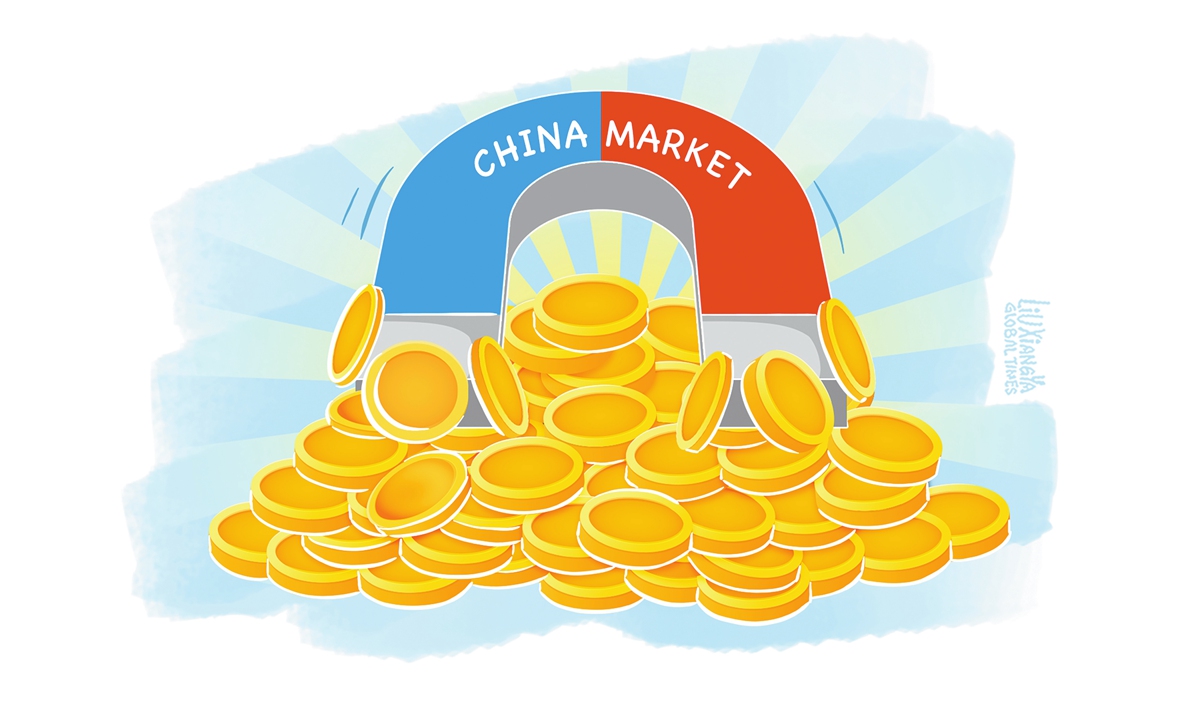
Illustration: Liu Xiangya/GT
A massive emerging market economy like China's always needs to value foreign direct investment (FDI), as it has been a catalyst for growth. FDI not only brings in much-needed capital but also helps in the transfer of technology, skills, and knowledge. This, in turn, boosts productivity and efficiency in the local economy.
To inspire more foreign direct investment in the country, Chinese authorities have removed restrictions on manufacturing access as part of China's efforts to further accelerate the opening-up drive. At the beginning of 2024, the State Council, the cabinet, promulgated a 24-point action plan, outlining a wide range of measures to expand market access in key Chinese industries, ensure equal participation of foreign companies in government bidding, and facilitate the exchange of international business personnel.
Foreign investment in China, in the terms of actual use, reached nearly 500 billion yuan (about $70 billion) in the first half of this year, reaching a relatively high level over the past decade. The number of newly registered foreign-funded companies also increased by 14.2 percent year-on-year to nearly 27,000, as reported by Xinhua News Agency.
Foreign investments have a long history of facilitating industrialization in worldwide. In the early 1980s, China expanded its preferential policies to attract FDI, and the inflow of much-needed foreign equipment and capital at that time helped accelerate China's comprehensive industrial progress and manufacturing sector sophistication. Economists worldwide support the free flow of capital across national borders, as it allows capital to seek out the highest rate of return.
Despite geopolitical tensions and anti-globalization headwinds, China remains attractive to foreign investment due to its vast and steadily growing market, advanced infrastructure and efficient logistical network, high-quality manufacturing base, sophisticated industrial supply, and a pool of highly trained researchers and engineers.
Naysayers and critics in the West have attempted to hinder and stifle the Chinese economy with tariffs and technology restrictions over the past few years, but their efforts have been ineffective. Protectionism is always a double-edged sword. High tariffs and curbs on technology have produced a negative impact on Chinese exports, indirectly affecting capital inflows to the country, but the fragmentation of the global supply chain has resulted in sharply higher production costs for many Western enterprises, pushing up Western inflation.
Technology curbs have worked to turbocharge China's efforts at intensifying domestic research and development to realize technological self-reliance. Recent years have seen the country make significant advancements in many homegrown technologies, from 5G, Internet of Things, AI, to green renewables. These advancements have successfully encouraged many multinational corporations to pledge more investment and expand their operations in China.
In addition to investing in Chinese manufacturing ventures, foreign companies are also strengthening their foothold in Chinese service sectors by investing in retail, entertainment, education, culture, medical care, financial services and more, as opportunities in China's manufacturing and service sectors abound.
As the world's largest emerging market economy, China has been committed to the basic state policy of reform and opening-up. Despite facing increasing "decoupling" and protectionism, China remains committed to keeping its door open. The country has vowed to act as the bedrock of integration and globalization, and China won't deprecate or turn its back on FDI, which lies at the heart of globalization and serves as the indispensable conduit for the transfer of capital, goods, services and information across different economies.
Last but not the least, China's political and economic stability provides the best condition for facilitating inflows of overseas capital. The sheer size of China's population and consumer market makes it an attractive place for global investors to commit capital to maturing industries like information technology, engineering, healthcare, luxury goods and entertainment. Few multinational companies can afford to ignore China's vast market opportunities.
The author is an editor with the Global Times. bizopinion@globaltimes.com.cn




